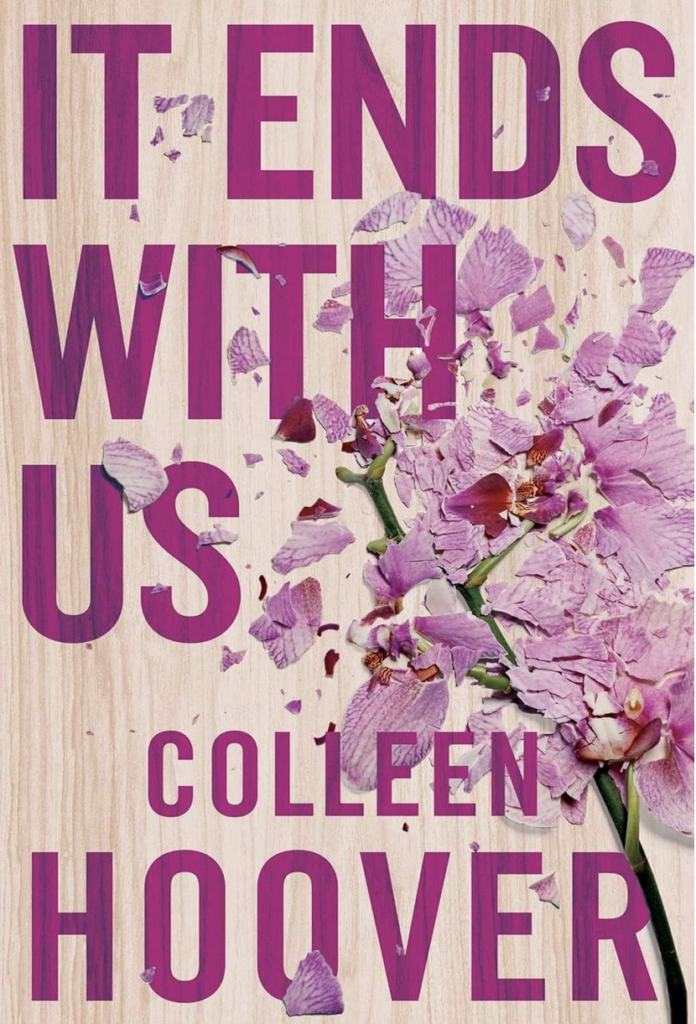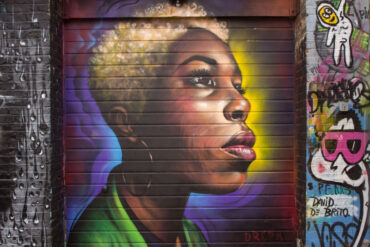Colleen Hoover’s It Ends With Us is a poignant exploration of love and resilience through Lily Bloom’s life. Navigating trauma and complex relationships, the novel confronts the realities of domestic abuse while highlighting the power of self-discovery and the strength needed to break free from cycles of violence.
By Yasmine Bounasse
Colleen Hoover’s It Ends With Us is more than just a love story; it’s a profound exploration of the human spirit, the complications of relationships, and the resilience needed to overcome life’s toughest challenges. The novel invites readers into the life of Lily Bloom, a woman who, despite a traumatic childhood, has managed to build a successful life in Boston. From the very beginning, Lily is depicted as a character of immense strength and perseverance, someone who has fought her way through personal hardships to carve out a meaningful existence. Her journey speaks to the resilience of the human heart and the remarkable ability to heal and grow, even in the face of unimaginable difficulties.
The novel traces Lily’s evolution from a young girl who witnesses abuse in her family to a woman who is determined to break the cycle and avoid the same patterns in her relationships. Hoover presents a gripping narrative of self-discovery and the courage to stand against the cycles of trauma that often plague families. At its core, It Ends With Us is a romance but also a narrative about breaking free, choosing self-love, and having the strength to rewrite one’s future.
The Tension Between Love and Control
Lily’s life takes an unexpected turn when she meets Ryle Kincaid, a successful neurosurgeon whose charisma and ambition make him seemingly the perfect match. Ryle is charming, brilliant, and deeply passionate about his career. On the surface, he appears to be everything Lily could ever want in a partner. However, as their relationship deepens, the complexities of Ryle’s character begin to show. Beneath his success and charm lies a troubled man with deep-seated emotional issues, particularly a strong aversion to romantic relationships. His inability to fully commit and his inner struggles create a sense of tension that underpins their relationship and adds to the story’s drama.
This complexity in Ryle’s character forces Lily to confront her desires, fears, and boundaries. His reluctance to fully commit and his emotional volatility push Lily to question what she truly values in a relationship – whether passion is enough, or if stability and respect should take precedence. While there is undeniable chemistry between them, Lily is soon faced with difficult questions about what she truly wants in a partner and what she is willing to tolerate. The more the reader learns about Ryle, the clearer it becomes that love is not always enough to make a relationship work. Hoover explores the grey areas of love and human emotion, portraying the struggle between passion and pain, desire and self-respect.
Confronting the Past
As Lily navigates her tumultuous relationship with Ryle, Atlas Corrigan, her first love, reenters her life. Atlas was a source of stability and hope during Lily’s troubled teenage years. With his unexpected return, he stirs up unresolved emotions and memories of a simpler, more innocent time. His presence in Lily’s life forces her to reflect on the past she had long buried, especially the love and connection they once shared. In contrast to Ryle, Atlas represents safety and emotional depth – qualities that were crucial in helping Lily survive her traumatic childhood.
The reappearance of Atlas complicates Lily’s already fragile relationship with Ryle, creating an emotional triangle that challenges Lily to reevaluate what she truly values in relationships. The tension between her past with Atlas and her present with Ryle is a central theme that drives much of the novel’s conflict. Lily is torn between the security and familiarity of her first love and the passion and excitement she feels with Ryle. Through this emotional struggle, Hoover skillfully explores themes of loyalty, love, and the haunting pull of the past.
A Nuanced Exploration of Domestic Abuse
What sets It Ends With Us apart from other romantic dramas is Hoover’s raw and honest portrayal of domestic abuse and the complex emotions that surround it. Through Lily’s experiences, Hoover does not shy away from the harsh realities of abuse. She presents it in all its painful complexity, highlighting not only the physical aspects but also the psychological and emotional toll it takes on the victim. The narrative intertwines present-day events with flashbacks that reveal Lily’s past experiences with abuse, allowing readers to witness how those events shape her current relationships. Readers are given an intimate look into the struggles Lily faces as she grapples with feelings of love, guilt, fear, and loyalty – all common emotions experienced by those trapped in abusive relationships.

It Ends With Us
Simon + Schuster UK: 2016
376 Pages, £9.99
Hoover’s depiction of Lily’s internal conflict is both heart-wrenching and thought-provoking. Lily’s love for Ryle is undeniable, but it is increasingly overshadowed by the growing realization that she cannot remain in a relationship that compromises her safety and well-being. The author challenges common misconceptions about abuse, illustrating how love and violence can coexist, making it incredibly difficult for victims to leave. Hoover’s ability to depict these emotions with nuance forces readers to think more deeply about the nature of abuse and the strength required to escape it.
Breaking the Cycle of Abuse
At its heart, It Ends With Us is a story about breaking the cycle of abuse. Hoover examines the intergenerational patterns of violence that often repeat themselves within families and relationships. Lily’s struggle is not just about freeing herself from her current abusive relationship with Ryle, but also about breaking the pattern of violence that she witnessed growing up. She is determined not to follow in her mother’s footsteps, to stop the cycle of pain and to protect her future and any future children she may have. The theme of resilience and empowerment lies at the core of the novel’s message.
Lily’s path is not an easy one. She faces moments of doubt, fear, and immense heartache as she wrestles with the decision to leave Ryle, especially when his temper flares. For instance, during a pivotal moment in the story, Ryle physically pushes Lily during an argument, leaving her shaken and questioning the love she feels for him. Additionally, he exhibits controlling behavior by isolating her from friends and family, further complicating her emotional landscape. But in the end, her choice to end the cycle of abuse by leaving Ryle is an act of great courage and self-love. Hoover’s portrayal of this process emphasizes the importance of self-preservation and the need to prioritize one’s safety and mental health over societal expectations or the fear of being alone. Lily’s story is a reminder that true strength lies in the ability to stand up for oneself, even when it means making painful sacrifices.
Authentic Characters and Emotional Depth
One of the most compelling aspects of the book is the writer’s ability to create deeply authentic characters. Each character is fully realized, with strengths, flaws, and vulnerabilities that make them feel real and relatable. Lily is not just a victim or a heroine; she is a complex individual who makes difficult choices and grapples with the emotional aftermath of those decisions. For instance, when faced with the decision to support Ryle during a critical moment in his career, she struggles with her feelings of loyalty to him while also recognizing the toxic patterns that threaten her well-being. This internal conflict showcases her depth, as she must navigate her desire to love Ryle while also prioritizing her mental health. Similarly, Ryle and Atlas are multi-dimensional characters, each embodying different aspects of love, desire, and personal struggle. This depth adds to the emotional resonance of the novel, allowing readers to connect with the characters on an individual level.
The author balances the novel’s more difficult themes with moments of tenderness, humour, and hope, creating a narrative that is as emotionally satisfying as it is thought-provoking. Through her portrayal of Lily’s relationships, Hoover explores the complicated dynamics of love and how it can both uplift and destroy. The emotional journey she takes readers on is both heartwarming and heart-wrenching, making It Ends With Us a story that stays with readers long after they’ve turned the last page.
The Anticipated Film Adaptation
As It Ends With Us continues to touch the hearts of readers worldwide, it is also making its way to the big screen with an eagerly awaited film adaptation. The adaptation offers a new lens through which to experience Lily, Ryle, and Atlas’ intertwined lives, bringing the emotional depth of the novel to life on screen. Fans of the book can look forward to seeing their favourite moments and characters translated into a visual medium, while newcomers will be introduced to the story’s powerful themes in a new format. The film promises to stay true to the heart of Hoover’s novel, capturing the raw emotion, heartbreak, and resilience that define the story.
For both longtime fans and those new to the book, the film adaptation provides an exciting opportunity to revisit – or discover for the first time – the deeply moving narrative that has resonated with so many. As Lily’s story transitions from page to screen, audiences are once again reminded of the strength it takes to break free from past traumas and the courage required to choose a better future. Whether through its written form or its cinematic counterpart, It Ends With Us continues to inspire and challenge, leaving an indelible mark on all who encounter it.






